
A process of unconventional gas production from which oil can be extracted from deep in the Earth has recently boomed in the United States.
Hydraulic fracturing, also known as fracking, is a process of extracting oil and natural gas from underground by creating fractures in the bedrock to stimulate flow, according to EPA.
The fractures are created by injecting a pressurized liquid--mostly containing water, sand or other chemicals--into it.
However, fracking is believed to have environmental effects not least to fossil fuel extraction and burning, NewsWeek reported.
"The first thing to remember here is that the scientific consensus is that, if we are to have any hope of averting catastrophic climate change, we can only afford to burn around one third of the fossil fuels that we can extract using conventional methods," said Keith Baker, a research fellow in fuel poverty and energy policy with the Built Environment Asset Management Centre at Glasgow Caledonian University in the United Kingdom.
However, "fracking also requires more energy to extract the same amount of gas than conventional methods-what we call the energy return on investment (EROI)-so the contribution of fracking to climate change is cumulatively even greater than conventional extraction," he added.
With those facts, fracking and all other unconventional extraction method are ruled out.
Fracking Causes Pollution
While fracking operations does not substantially reduce carbon dioxide emissions replacing coal, it does not mean that it is a sustainable or clean energy resource, said Mark Ireland, a lecturer in energy geoscience, at Newcastle University in the U.K.
"As with other methods of oil and gas extraction, when done well the negative environmental impacts can be minimized," he told Newsweek.
According to Richard Davies, Pro-Vice Chancellor of Global at Newcastle University, the fracking boom in the United States has been often been characterized by "poor practice".
Contribution to Climate Change
Fracking can also cause air pollution according to Baker, releasing potent greenhouse gases, such as methane and nitrous oxides.
In addition, it can pollute the water from leaked toxic chemicals that originates in the ground when extracting fossil fuels.
"Unsurprisingly, the fracking industry is very cagey about releasing data on the types of chemicals used, but they are known to include the BTEX chemicals (benzene, toluene, ethylbenzene, and xylene) as well as ozone and hydrogen sulphide," Baker explained.
The industry also destroys landscapes as it is also highly mobile.
Unlike conventional drilling, fracking captures relatively small amounts of gas so once extraction has been completed, they move on to other sites, meaning they would use more vehicles, or else pipelines will have to be extended constantly to follow the wells.
In very rare cases, the drilling operation could trigger minor earthquakes.
Subsequently, fracking was also linked to several short and long-term health problems, NRDC reported.
Health problems associated with pollution from fracking includes severe headaches, nausea and vomiting, asthma symptoms, cardiovascular disease, chronic obstructive pulmonary disease, stomach and intestinal irritations, liver damage, and numerous forms of cancer.
Related article : Millions of Tons of Extremely Reactive Chemicals Found Lingering in the Earth's Atmosphere
© 2025 NatureWorldNews.com All rights reserved. Do not reproduce without permission.





